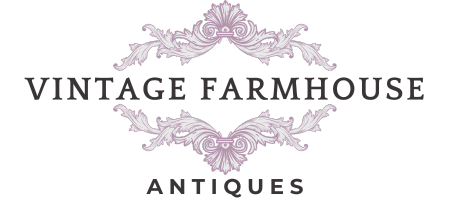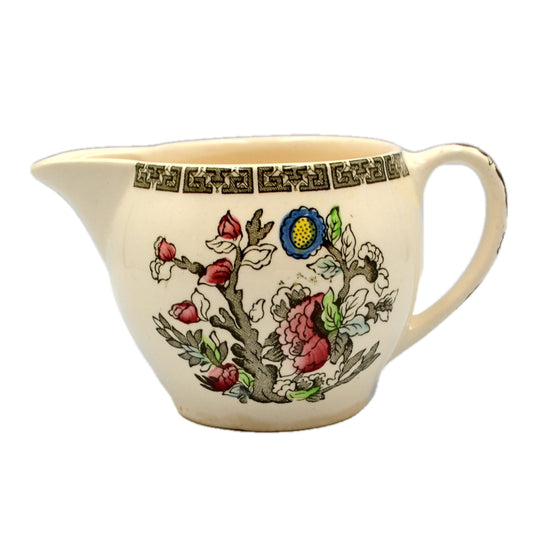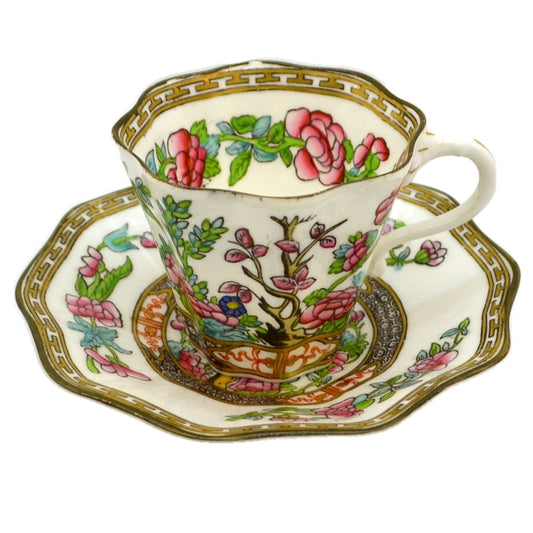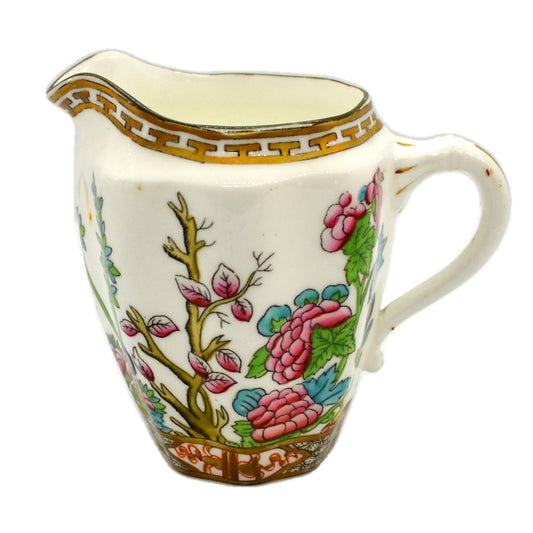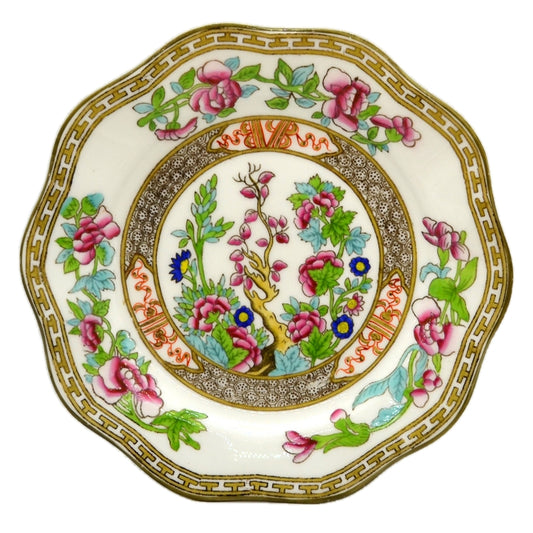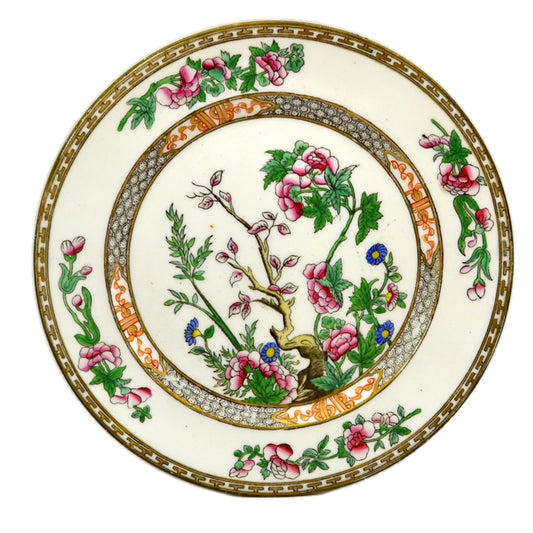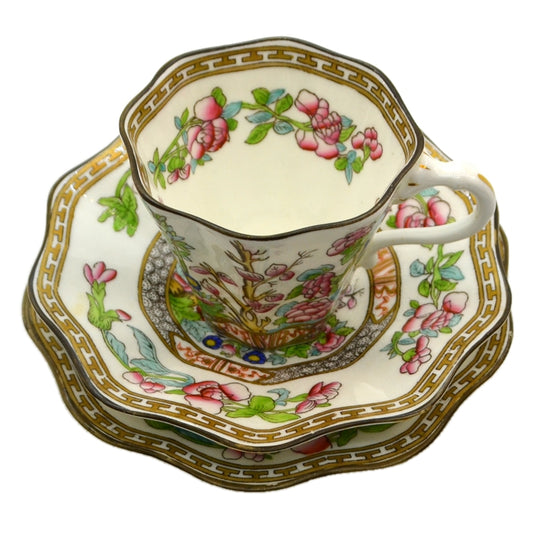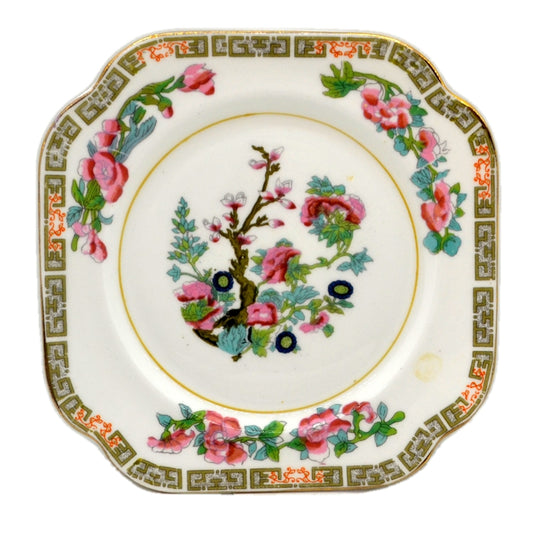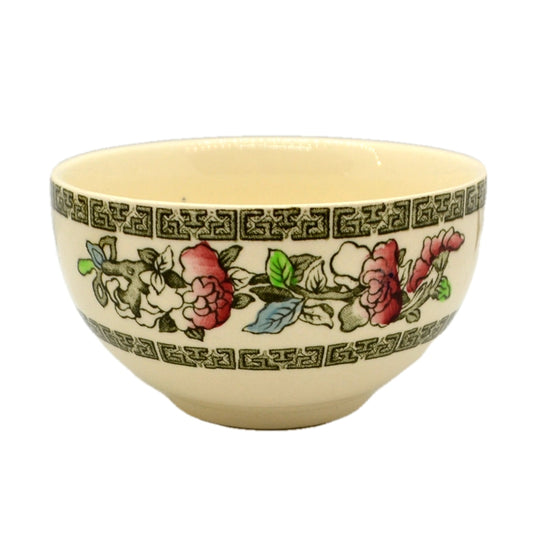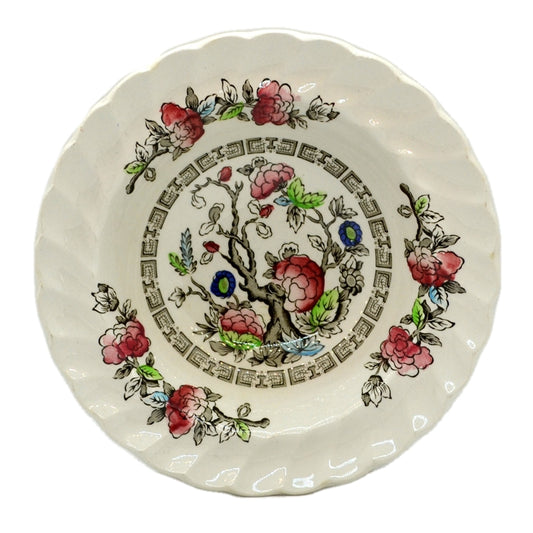Indian Tree pottery and crockery for sale online.
There are almost as many interpretations of Coalport's Indian Tree Pattern as there were factories in Staffordshire. We have a huge selection of them on catalog with detailed descriptions, pictures and many with video presentations to help you chose. Browse our selection of top quality vintage and antique Indian Tree china for sale . Worldwide shipping from England.
The Indian Tree pattern is a widely recognised and popular design in pottery, characterised by its intricate and colourful floral and tree motifs inspired by ancient Chinese and Indian designs. Although Johnson Brothers is one of the most famous producers of this pattern, several other manufacturers also created their own versions of Indian Tree pottery.
Here’s an overview of the Indian Tree pattern and other notable producers of Indian Tree pottery, china and crockery:
Johnson Brothers
Johnson Brothers, established in 1883 in Stoke-on-Trent, England, became renowned for their durable earthenware and stoneware. Their Indian Tree pattern is one of their most iconic and collectible designs, featuring vibrant colours and intricate details. Johnson Brothers only produced Indian Tree between 1979 and 1983 The Johnson Brothers Indian Tree pattern is still very popular today, with vintage and antique china collectors. Johnson Brothers is underglaze transfer printed with no gilt, making it safe for microwaves and with care, dishwashers.
Other notable English manufacturers of Indian Tree pattern pottery and crockery
Coalport
- History: Coalport was founded in 1795 in Shropshire, England, and became known for its high-quality bone or porcelain china molds and shapes.
- Coalport is widely credited with the introduction of the Indian Tree Design: Coalport’s Indian Tree pattern often features more delicate and detailed designs with subtle variations in colour compared to Johnson Brothers.
- Being porcelain, Coalport is lighter than other options and more fragile. The shapes and detail in the transfer print are the best, but it need careful use and washing.
Spode
- History: Spode, established in 1770 in Stoke-on-Trent, is another prestigious English pottery manufacturer.
- Indian Tree Design: Spode’s version of the Indian Tree pattern is known for its fine bone china and intricate hand-painted details, sometimes using a softer and more pastel colour palette.
Wedgewood
- History: Founded in 1759 by Josiah Wedgwood, this company became synonymous with quality ceramics.
- Indian Tree Design: Wedgwood’s Indian Tree pattern is notable for its refined design and use of high-quality materials. The colours might be more muted and the overall aesthetic more classical.
Royal Worcester
- History: Established in 1751, Royal Worcester is one of the oldest remaining English pottery brands.
- Indian Tree Design: Royal Worcester’s version of the Indian Tree pattern often features a more elaborate and ornate design, with fine detailing and sometimes gilded accents.
Minton
- History: Minton was founded in 1793 and became famous for its china and majolica wares.
- Indian Tree Design: Minton’s Indian Tree pattern is typically elegant and detailed, often utilising a more extensive colour range and sophisticated craftsmanship.
Aynsley
Aynsley is another notable English china manufacturer that produced Indian Tree pottery, adding to the pattern's rich history and appeal.
- History: Established in 1775 by John Aynsley in Longton, Staffordshire, Aynsley is renowned for producing fine bone china and high-quality ceramics. The company quickly gained a reputation for its intricate designs and meticulous craftsmanship.
- Indian Tree Design: Aynsley's version of the Indian Tree pattern is celebrated for its exquisite detail and the delicate quality of its bone china. The company's interpretation often features a slightly softer colour palette compared to other manufacturers, lending a distinct elegance to the pieces, and for this reason is one of our favourites.
- Craftsmanship: Aynsley is known for its rigorous quality standards and attention to detail. The Indian Tree pieces produced by Aynsley are often distinguished by their fine, smooth finish and the precision of the hand-painted motifs.
- Collectability: Aynsley's Indian Tree pottery is highly collectible due to the company's reputation for quality and the beauty of its designs. Collectors often seek out Aynsley pieces for their refined aesthetic and the prestige associated with the brand.
Characteristics of Indian Tree Pottery
- Design elements: The central feature is usually a stylised tree with blossoms and foliage, often surrounded by smaller floral motifs and sometimes birds or other elements.
- Colour palette: Commonly includes greens, pinks, reds, and blues, although variations exist depending on the manufacturer and specific era of production.
- Materials: Most Indian Tree patterns are produced on earthenware, stoneware, or bone china, with the quality of materials varying by manufacturer.
Collectibility
Indian Tree pottery remains highly collectible due to its historical significance, aesthetic appeal, and the craftsmanship involved in its production. Collectors often seek out pieces based on their condition, rarity, manufacturer, and specific characteristics of the design.
Overall, Indian Tree pottery represents a beautiful and historically rich category of ceramic art, with contributions from several esteemed pottery manufacturers, each bringing their unique touch to this beloved pattern
